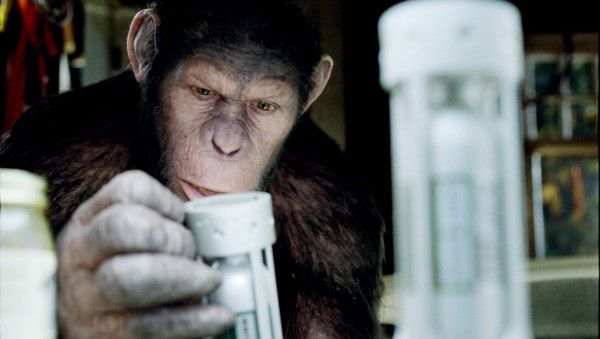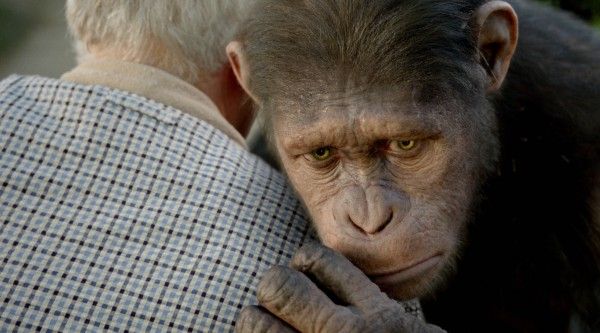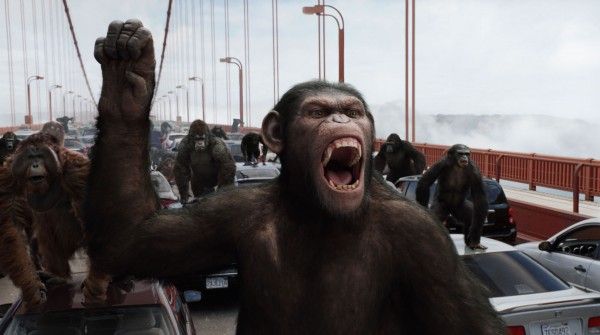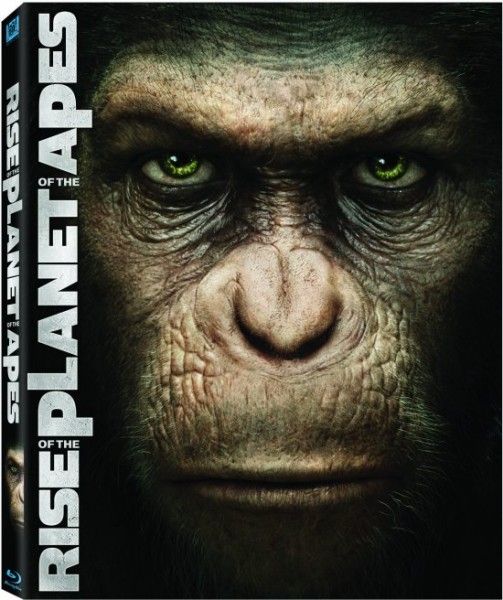One of the biggest surprises for me this year was Rupert Wyatt’s Rise of The Planet of The Apes, a film that I had steadfastly refused to see for weeks after its release: The Apes franchise is not a franchise I have ever loved (or even liked), the inclusion of James Franco seemed beyond-ominous to me (and the trailers seemed to support my suspicions), and the fact that 20th Century Fox was selling their film on the gee-whiz sight of an ape fighting a helicopter seemed—at the time—like the very definition of absurd to me. Ladies and gentlemen, it is time for me to eat some serious crow: Rise of The Planet of The Apes is one of the year’s best films, a rare combination of “good ideas” and “holy crap” special effects that completely changed my opinion of what this franchise could be. You should see it, but first, read on for my full review, after the jump.
Like it says in the intro, I wasn’t thrilled by the prospect of Rise of The Planet of The Apes (hereafter RoTPoTA, because, I mean, Jesus). It took weeks of needling from some of my friends to get me into a theater screening the film, and even then I was really only going because, hey, the Alamo Drafthouse has some seriously great food: worst case scenario, I get to eat pizza and watch a trainwreck. I was convinced that RoTPoTA would be a complete waste of time, a definitive end to the Apes franchise that seemed utterly redundant given Tim Burton’s calamitous “rebootmakequel”, but my friends insisted that I was wrong.
“One of the best movies of the summer,” they said. “One of the best movies of the year,” some of them corrected. “The best Apes movie ever made,” said One-Upper McGee.
Because these were people whose opinions I respected (who hadn’t also recently suffered a traumatic brain injury), I decided to give the film a shot, and holy crap am I glad I did. RoTPoTA really is the best Apes film ever made. It’s also the summer’s best film, and yes, it’s also one of the best films of the year. After the screening I attended, I could be found outside the Drafthouse, nuzzled up next to the RoTPoTA poster outside, doing my best Ike Turner impression: “C’mon, baby, you know I didn’t mean all those nasty things I said about you. I just get so scared sometimes. You know I love you! Now, let’s go out for dinner, anywhere you want. Except Chili’s” (Little Known Fact: Ike Turner hates Chili’s).
Now, you might be a diehard Planet of The Apes fan who’s known all along that an Apes film this good was bound to come along sooner or later, but I’ve never been a true believer in this franchise, and what Rupert Wyatt has done here is—to my eyes—a miracle: he’s made the Planet of The Apes series interesting. And exciting! And intelligent! I don’t know that Wyatt deserves the “Best Directing” Oscar at this year’s Academy Awards ceremony, but he certainly deserves some sort of official recognition for the feat he’s pulled off here (Maybe a Golden Globe? They give those out for just about anything, so this oughtta be a shoe-in).
In case you skipped the film when it was in theaters (and, believe me, I get it, but ignore your instincts), here’s the setup: Rise of The Planet of The Apes is basically the origin story for the Planet of The Apes franchise. A scientist by the name of Will (Franco, known in some nefarious circles as “Dicknose”) is working on a cure for Alzheimer’s-- primarily through the use of futuristic-looking PowerPoint presentations and the art of jabbing monkeys with needles—when he makes a startling breakthrough: a new medication/compound that erases the effects of the disease while increasing brain capacity. The company he works for loves the sound of all this, but just as he’s about to finally convince the head honchos that his new drug is one worth mass-producing, one of Will’s apes goes, uh, apeshit and runs amok inside the drug company’s headquarters, injuring several workers and destroying dozens of fancy-looking chairs. Because this drug company is—in the tradition of all great drug companies in sci-fi movies—greedy and evil, they immediately deny Will the chance to continue working on his wonderdrug and order that all the apes be destroyed.
Will has his assistant murder all the other apes (note to self: “murder” might be a strong word-choice there; come back later and change that), but decides that one of the apes is worth saving. He takes it home, introduces it to his Alzheimer’s-ridden father (John Lithgow, simultaneously awesome and kinda-hammy), and decides to keep it as a pet. Meanwhile, he starts giving his father some of this cure he’s been working on, and—in very short order—his Alzheimer’s starts to regress. It does, in fact, seem to disappear overnight. Thing is, the drug company’s still bent outta shape about that whole “ape running amok” thing, so Will continues to try and convince them to reconsider while A) enjoying life with his newly-cured father and B) raising the ape—now named Caesar—on his own.
Well, one thing leads to another, and Caesar ends up getting in trouble, the sort of trouble that ends with him locked up in what basically amounts to an ape-prison. It’s here that I’ll mention that all of the apes in the film are played by actors in motion-capture suits, and that the part of Caesar is played by all-around badass Andy Serkis (he was Gollum in Peter Jackson’s Lord of The Rings trilogy). Up until now, I’ve been very dismissive of the mo-cap process, as it’s primarily been used to produce films like The Polar Express and Beowulf, stuff that no one in their right mind would call a “good movie”. It’s seemed like a gimmick to me, yes, but it’s also seemed like the kind of thing that would be incredible if used properly. Jackson did it well in the LotR movies, of course, but Wyatt’s perfected it here with Serkis’ performance as Caesar.
Serkis is so good, in fact, that there’s considerable Oscar-buzz surrounding his performance, and every bit of it is justified. The early scenes where Caesar’s monkeying around (no pun intended) Will’s house are fairly impressive, but once Caesar gets to that ape-prison, things really take off: a huge portion of the film is set here, and—because 90% of the action is unfolding between apes—most of it is done wordlessly, with mo-capped actors bringing these locked-up apes to life. These scenes are incredible, both for the artistry on display and for their effectiveness. Quick: what’s the last, big, blockbuster summer movie you saw where at least half of the film was played by photorealistic animals who didn’t speak? This was a massive gamble on 20th Century Fox and Wyatt’s part, but it’s paid off stunningly.
Eventually, Caesar figures out how to get all the apes to join forces with him in his fight against humanity (he’s really, really bitter about the whole “being locked up” thing, not to mention the brutal treatment that he and his ape comrades suffer at the hands of Brian Cox, who runs the ape-prison), and at that point it’s only a matter of time before Caesar leads an impromptu uprising against his captors. Where that uprising leads and how it all plays out is something I’ll leave for you to discover, but rest assured that every last minute of it is compelling, gorgeously rendered and edited, and truly spectacular.
A note to those of you who are really excited about the prospect of seeing Rise of The Planet of The Apes on Blu-ray: I watched RoTPoTA twice, on two different televisions. The first time, I watched the film on a 50” 3D LED television (while I’ve avoided buying 3D movies, 3D video-gaming is incredible, and I wholeheartedly recommend it; that said, RoTPoTA is not available in 3D) and was disappointed at how the apes looked under the LED microscope: the unforgiving clarity of that format seemed to be a bit much for the fine work that WETA put into those digital monkeys. The second time I watched the film, it was on a 55” Plasma television, and I had a much better experience. I’ve found—since picking up that LED set a month or so ago—that many, many films look startlingly brilliant in LED, but that effects-heavy stuff like RoTPoTA doesn’t necessarily benefit from that clarity. If you’re eager to see the film, do it on the best Plasma screen you can find: you’ll prefer it.
That said, the audio/video quality here is really stunning, and the Blu-ray comes packaged with a slew of great bonuses: there are 11 deleted scenes (some of which are really good), featurettes dealing with Andy Serkis’ performance (“The Genius of Andy Serkis”, which is aptly titled) and the mo-cap tech used on the film, a featurette on “The New Generation of The Apes”, another on the mythology of the Apes franchise, a featurette on the score, a concept art gallery, a commentary with Wyatt (absolutely essential listening), and a bunch of other stuff. By the time you’re done pouring through this disc, you’ll be more than satisfied.
No one’s more shocked about how great RoTPoTA is than I am, and I feel genuinely sorry about how hard I was on the film before seeing it. Wyatt’s film proves that a book cannot always be judged by its cover, and—more importantly—it proves that 20th Century Fox has a helluva good franchise on their hands…if they continue to treat it with the care and respect that Wyatt’s treated it with here. I’m not opposed to the idea of a Rise of The Planet of The Apes: Rise Harder, but I’d be very, very nervous if the studio brought on anyone else to futz around with this franchise (note: the same creative team is, in fact, handling the RoTPoTA sequel): these guys clearly understand how to make a brilliant Apes movie, so they should be allowed to continue doing so until it becomes evident that they’ve either A) run out of stories to tell or B) forgotten how to do that. Let’s hope that doesn’t happen for a long, long time.
My grade? A-





